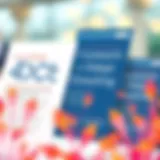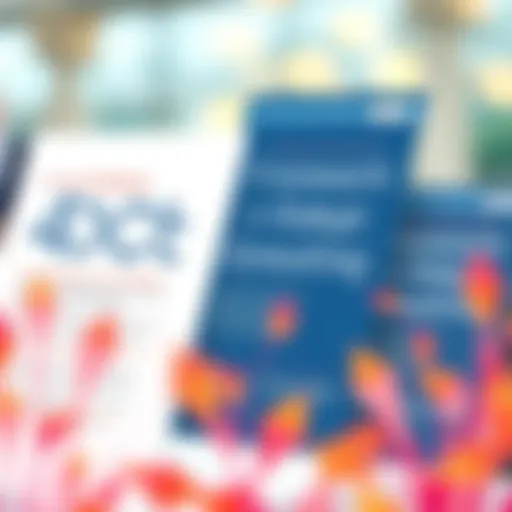Navigating Psychology Literature in the Digital Era


Intro
The world of psychology books has undergone a seismic shift in the digital age. Readers can now access a treasure trove of literature that was once confined to physical shelves in libraries or bookstores. This evolution has not only made it easier to dive into the subject, but it's also fostered a deeper understanding of oneself and others. As we navigate this vast ocean of knowledge online, it becomes vital to know where to look and how to engage with the material effectively.
In this article, we’ll venture into the nuances of psychology literature, emphasizing its relevance in today's fast-paced world. We’ll break down the categories of impactful books, offering insights that resonate with lifelong learning and personal development. Moreover, we will explore the importance of psychological knowledge across various facets of life and introduce platforms like Fabsli that provide free resources for eager learners.
It is imperative to recognize that psychology is not merely an academic subject; it's a tool that can be wielded for personal growth and improvement. Whether you're a student, a professional, or simply an avid reader, understanding psychological concepts can be life-altering.
Let’s embark on this journey together, exploring the rich terrain of psychology literature in the digital realm.
The Digital Revolution in Psychology Literature
The transition from traditional print mediums to digital formats has dramatically reshaped the landscape of psychology literature. We're witnessing a seismic shift in how information is disseminated, consumed, and engaged with by anyone interested in the field. With the advent of the internet, psychology books, research, and articles are more accessible than ever before. This revolution brings significant implications for both learners and educators. It encourages independent study and provides a platform for diverse voices within the realm of psychology.
One noteworthy aspect is the sheer volume of material now available at our fingertips. Readers can scroll through vast databases to find resources that resonate with their interests or professional pursuits. This abundance prompts a need for critical thinking; navigating the waters of psychology literature requires discernment. Many topics in psychology are complex, and not all sources hold the same weight or credibility. So, the digital age is not just about easy access, but also about understanding the importance of evaluating sources critically.
Furthermore, digital formats enhance interactivity and engagement. Many online platforms are designed to create a more immersive reading experience. E-books often include features like hyperlinks to studies, video tutorials, and engaging multimedia content—elements that traditional print simply can't match.
"In the age of information overload, the way we access and critically evaluate psychology literature is crucial for a deeper understanding of ourselves and our connections with others."
Transitioning from Print to Digital
In the past, acquiring psychology literature meant navigating crowded library aisles or waiting for books to be delivered. Now, with a few clicks of a mouse, an aspiring psychologist can have access to a vast expanse of literature. However, the transition from print to digital isn't without its downsides.
Many readers still appreciate the tactile experience of flipping through the pages of a physical book. The smell of print and the weight of a hardcover volume can add layers of comfort and focus that a digital screen sometimes lacks. There's something about marking a book, underlining important passages, that anchors readers in their learning.
Yet, digital formats often provide myriad benefits that the printed word cannot. For instance, readers can adjust font sizes, search for specific terms, and highlight notes more efficiently than they might in a physical copy. Audiobooks and podcasts have further diversified how literature can be absorbed, catering to auditory learners and busy individuals.
The Accessibility of Online Resources
The digital realm has opened the floodgates for accessibility in psychology literature. Online databases, websites, and apps have democratized access to information that was once sequestered behind paywalls or local library memberships. Tools like Google Scholar allow anyone to search for scholarly articles regardless of their institutional affiliations.
Free platforms such as Project Gutenberg or Open Library offer access to thousands of classic psychology texts. This ensures that even those with limited financial means can study the foundational theories and research that have shaped the field.
Moreover, social media platforms like Reddit and Facebook host diverse communities dedicated to psychology. Through forums, readers can discuss, share, and critique literature collaboratively, enhancing their understanding via peer interaction and fostering a sense of collective learning.
Overall, the digital revolution in psychology literature represents an exhilarating shift—an evolution that connects us to knowledge like never before while challenging us to be discerning, engaged, and proactive learners in our psychological journey.
Identifying Key Psychology Books
When diving into the vast ocean of psychology literature, pinpointing the right books can feel like looking for a needle in a haystack. 'Identifying Key Psychology Books' serves not just as a guiding light, but as a foundational step toward gaining insight into the human mind. Literature in this field carries the potential to transform personal understandings and catalyze growth, but not all books are created equal. Important factors like the author's credibility, the relevance of the content, and the practical applications of the theories discussed are crucial.
This section explores timeless classics and recent groundbreaking works. By focusing on these key texts, readers can develop a solid grounding in psychology that is helpful in both academic pursuits and everyday life. The imagination grows when the mind feeds on innovative ideas, and these books can provide that nourishment.
Noteworthy Classics in Psychology
The Interpretation of Dreams
Sigmund Freud's The Interpretation of Dreams is often regarded as a cornerstone of modern psychology. Freud introduces the theory of dream interpretation as a window into our unconscious mind. He delves into the complexities of human desire and fear. The key characteristic of this work lies in its pioneering exploration of how dreams uncover hidden emotions.
Readers find this book beneficial not just due to its historical significance, but also because it invites them to reflect on their own dreams and thoughts. Its unique feature is the use of case studies, allowing readers to see theories in action. However, one might find that Freud’s approach could appear a bit outdated; his methods are nevertheless thought-provoking for those looking to understand the foundations of psychological theory.
Man and His Symbols
Carl Jung’s Man and His Symbols offers unique insights into the man’s psyche, marking a shift from Freud's focus on sexuality to a more comprehensive understanding of symbolism. Jung discusses how symbols in dreams and art can profoundly impact our lives. His work is characterized by a rich tapestry of ideas on archetypes and the collective unconscious, setting it as a beneficial entry point for readers seeking clarity about complex human behaviors.
A unique feature of this book is the collaboration with artists and analysts which artfully combines theory and practice. Yet, the depth of Jung’s theories can be daunting, so readers should approach it with an open heart and a curious mind to fully grasp its implications.


Thinking, Fast and Slow
Daniel Kahneman's Thinking, Fast and Slow dives into the mechanisms behind the decision-making process, discussing two systems of thought: the fast, intuitive system and the slower, more deliberate one. This book highlights the biases that affect our thinking, making it a critical read for anyone looking to improve their judgment.
This book is particularly popular given its easy-to-digest anecdotes that reveal the complexity of everyday decisions. The unique aspect involves applying psychology to real life, showcasing experiments that lead to unexpected outcomes. Some might find the concepts a tad overwhelming due to Kahneman's extensive exploration of cognitive biases, but the insights provided are invaluable for personal and professional growth.
Recent Publications Worth Reading
The Body Keeps the Score
Bessel van der Kolk’s The Body Keeps the Score opens up new avenues in understanding trauma’s effects on both mind and body. This work is critical not only for professionals in the therapy field but also for anyone interested in the interplay between mental health and physical well-being. The key characteristic is its interdisciplinary approach, marrying neuroscience, psychology, and personal accounts.
The book’s unique feature lies in its practical guidance on coping and recovery. Readers may find it transformative and grounding, though its graphic descriptions might be disturbing for some, potentially making it less accessible to sensitive audiences.
Atomic Habits
James Clear’s Atomic Habits provides a fresh perspective on behavior change. It addresses how small, incremental adjustments can yield major results over time. This work is pivotal for readers wanting to develop sustainable habits. Its key characteristic is the urge for practicality—Clear integrates actionable strategies and real-life examples seamlessly.
The unique feature here is the emphasis on systems instead of goals, encouraging a shift in mindset that many find liberating. While the book is engaging, some may argue that the suggestions can feel repetitive if they are well-versed in habit formation theories.
Mindset: The New Psychology of Success
Carol S. Dweck’s Mindset: The New Psychology of Success focuses on the concept of fixed versus growth mindset. This enlightening read has gained traction for its appeal to educators, parents, and professionals. The key characteristic revolves around the idea that our beliefs shape our abilities.
Its unique feature is the straightforward language, making complex psychological ideas accessible to many. Dweck illustrates her points through real-world scenarios. A downside could be that some readers might oversimplify success as merely a matter of mindset, potentially overlooking the social and contextual factors that play a role in achievement.
In summary, identifying key psychology books is not just about knowing what to read; it's about understanding the impact these texts can have on the reader’s perspective and knowledge. Engaging with both classics and contemporary works creates a rich tapestry of understanding about the intricate web of human behavior.
Platforms for Accessing Free Psychology Literature
In this digital era, the accessibility of psychology literature has been revolutionized, altering how readers engage with complex ideas and theories. Understanding the platforms that offer free resources is essential for anyone who seeks knowledge in the field of psychology without straining their finances. These platforms not only expand knowledge horizons but also provide a treasure trove of materials for lifelong learners. Here, we explore significant platforms and discuss their offerings, functionalities, and what makes them stand out in the expanse of digital psychology literature.
Fabsli: A Resource for Lifelong Learners
Overview of Fabsli's offerings
Fabsli is shaping up to be a noteworthy player when it comes to providing free access to psychology literature. This platform is targeted at individuals who possesses an insatiable thirst for knowledge. The key characteristic of Fabsli is its curated selection of resources; it’s not just a sea of data—rather, it's a lighthouse guiding users toward substantive content.
The unique feature of Fabsli lies in its approach to curation. Many platforms host a vast array of materials, leading to a hodgepodge of information that can often be overwhelming. Fabsli, however, employs a friendly handpicked selection that not only simplifies the search process but also ensures that users are accessing quality information. While it's a fantastic choice for finding significant texts, potential users should be made aware that the specific focus might limit the breadth compared to more extensive platforms.
User-Friendly Navigation
Navigating through Fabsli is a smooth affair, designed with the user in mind. The interface draws in users with its straightforward structure—everything is just a couple of clicks away, making it easy to traverse different sections and topics. This characteristic significantly enhances the user experience as it reduces the time spent searching for what one needs.
A unique feature of the navigation system is the intuitive organization based on user behavior and trending topics. This not only allows users to find popular articles but also encourages the exploration of less-known materials that might pique their curiosity. However, like any platform, it may not cater perfectly to everyone, as some users might seek a more advanced search feature that provides specific academic papers or journals.
Alternative Online Platforms
Project Gutenberg
Project Gutenberg is a vibrant resource, boasting a rich collection of over 60,000 eBooks, including many significant works in psychology. The primary benefit of this platform is the sheer quantity of materials available for public consumption. Readers can access timeless classics without any cost or subscription.
What sets Project Gutenberg apart is its commitment to accessibility. eBooks are available in various formats— for instance, plain text, ePub, and Kindle— making them versatile for readers globally. On the downside, the search functionalities can be slightly dated, which may require users to spend more time than they’d wish locating specific titles.
Open Library
Open Library offers an appealing alternative to those in search of psychology texts. This initiative, backed by the Internet Archive, aims to create a web page for every book ever published. Open Library’s key trait is its inclusive catalog; it allows users to borrow and read many titles, making previously hard-to-find resources easily accessible.


The platform’s unique feature is its collection of borrowable texts, functioning quite like a traditional library. This stand-out characteristic allows readers to explore a variety of materials not typically found on other online repositories. However, the borrowing system may seem limiting for those preferring immediate access to a larger library of texts without the borrowing parameters.
Internet Archive
Internet Archive represents a colossal trove of information across various formats, including a significant collection of psychology literature. Its key offering is its mission to archive and provide free access to human knowledge, which aligns beautifully with the goal of education and enrichment.
A unique aspect of this platform is its Wayback Machine, a tool allowing users to access earlier versions of web pages— a touch that adds a historical dimension to understanding texts. However, the breadth of content can be a double-edged sword; while it offers a diverse range of resources, the navigation may prove challenging for those unfamiliar with vast databases.
Benefits of Reading Psychology Literature
Reading psychology literature offers a treasure trove of insights that can change how we see ourselves and the world around us. In a digital age where information is at our fingertips, understanding the benefits of delving into this field has never been more crucial. This literature doesn't merely serve academic purposes; it acts as a roadmap for personal development and social interaction, enhancing self-awareness and interpersonal skills.
Enhancing Self-Awareness and Personal Growth
At the heart of psychological reading is the quest for self-awareness. Engaging with texts like Man and His Symbols by Carl Jung propels individuals to explore their inner workings, dreams, and motivations.
- Increase Reflection: Reading these works often encourages readers to reflect on their thoughts and behaviors. This can lead to profound realizations about one's own biases, triggers, and growth areas.
- Practical Tools: Many authors provide exercises or frameworks that one can apply in daily life. For instance, concepts derived from The Body Keeps the Score by Bessel van der Kolk can be utilized to manage trauma responses, making literature a valuable tool in the journey of personal development.
"> Self-awareness is the cornerstone of emotional intelligence, paving the path for meaningful relationships and personal satisfaction."
Understanding Human Behavior
Deepening our knowledge of psychological principles paves the way for better understanding ourselves and others. Works such as Thinking, Fast and Slow by Daniel Kahneman unravel the complexities of decision-making and cognitive biases.
- Behavioral Insights: By grasping why people act as they do, one gains the ability to respond rather than react in various situations. This understanding fosters not only personal growth but also enhances interpersonal dynamics.
- Cultural Perspectives: Psychology literature often introduces diverse cultural views, enriching one’s comprehension of human experiences beyond their own milieu. Reading about various psychological theories allows for a richer appreciation of human diversity and congregates collective wisdom.
Fostering Empathy and Emotional Intelligence
Reading psychology literature goes a long way in nurturing empathy and emotional intelligence. These are vital competencies in the modern world, where connections are often superficial.
- Developing Compassion: Engaging with narratives of psychological struggle, as seen in The Gift of Imperfection by Brené Brown, can evoke compassion and understanding. Fostering these feelings helps in building stronger connections with individuals who may be facing their own challenges.
- Emotional Regulation: By learning about emotional reactions and coping strategies, readers can better navigate their own emotional landscapes. Knowledge derived from psychological texts empowers individuals to manage their emotions more effectively, leading to healthier relationships and improved social interactions.
In summary, engaging with psychology literature is much more than reading; it is a transformative process that touches various aspects of life. By enhancing self-awareness, understanding human behavior, and fostering empathy, readers emerge more equipped to confront the complexities of their personal and social landscapes.
Integrating Psychology Concepts into Daily Life
Today’s rapid advancements in psychology have made its concepts more accessible than ever. Integrating these ideas into our daily routines can foster a richer understanding of ourselves and the world around us. This integration serves several purposes: it can enhance clarity in personal relationships, improve mental health, and lead to better decision-making. With the methods and insights derived from psychology, anyone can turn abstract theories into practical tools that guide everyday behavior.
Practical Applications of Psychological Theories
Psychological theories provide frameworks for understanding behavior and mental processes. Here are several practical applications:
- Cognitive Behavioral Techniques: These techniques help reshape negative thought patterns that can lead to anxiety or depression. For instance, keeping a thought journal enables individuals to identify harmful beliefs and work through them systematically.
- Applied Behavior Analysis: This can be beneficial in educational settings. By observing behaviors and the variables affecting them, educators can tweak environments to promote positive behaviors among students.
- Attachment Theory in Relationships: Understanding attachment styles can enhance our interpersonal relationships. When one knows their style—be it secure, anxious, or avoidant—they can communicate better with partners, leading to healthier relationships.
In short, by drawing on established psychological theories, individuals can tackle challenges with more tailored approaches. Understanding psychological theories not only benefits oneself but also enhances social interactions.
Adopting Mindfulness and Resilience Techniques
Mindfulness and resilience are critical components of mental health that can be cultivated and practiced daily. They shape our ability to cope with stress and recover from setbacks. Here’s how these techniques can be applied:
- Mindfulness Meditation: Finding even a few minutes each day to meditate can shift one's focus from persistent worries to the present moment. Apps like Headspace or Calm provide guided sessions suitable for beginners.
- Breath Control: Learning how to control breath serves as an immediate tool in calming nerves. Techniques such as 4-7-8 breathing help regulate anxiety, enabling clearer thinking.
- Positive Affirmations: Using daily positive self-talk can cultivate a resilient mindset. Repeating statements like "I am capable" can gradually shift self-perceptions toward the positive.
"Mindfulness is a way of befriending ourselves and our experience." — Jon Kabat-Zinn
Incorporating mindfulness into daily practices not only enhances focus but also equips individuals with the tools necessary to bounce back when faced with adversity. By consciously applying resilience techniques, one can navigate the nuances of life more fluidly.
In essence, the application of psychological concepts enhances self-awareness and empowers individuals to manage challenges effectively. Whether through understanding behavior, practicing mindfulness, or fostering resilience, integrating psychology into everyday life proves invaluable.


Current Trends in Online Psychology Reading
As the digital realm evolves, so does the way we consume information — particularly in the field of psychology. In this section, we’ll explore the current trends shaping online psychology reading, emphasizing how these changes benefit students, professionals, and avid readers alike. Understanding these trends helps in navigating the vast sea of literature available today and enhances one's learning experience.
Emergence of Audiobooks and Podcasts
In recent years, audiobooks and podcasts have emerged as popular formats for consuming psychology literature. This shift marks a significant change in how knowledge is transmitted and consumed. Many readers find the audio format to be remarkably convenient, allowing them to engage with materials while they commute, exercise, or even cook. Here are several key points regarding the rise of audiobooks and podcasts in psychology:
- Accessibility: Audiobooks offer an alternative for people who struggle to find time to read or have visual impairments. It opens doors to psychological concepts for everyone.
- Narrative Style: The auditory experience often brings texts to life in a unique way, allowing listeners to grasp complex ideas through voice inflections and storytelling techniques.
- Variety of Content: Podcasts, in particular, have exploded in popularity, providing insights from experts in the field, interviews, discussions, and much more. They offer listeners a more personable approach to psychology.
This trend shows no signs of slowing, as both audiobooks and podcasts provide a legitimate platform for deeper engagement with psychological literature.
Engaging with Interactive Learning Tools
Interactive learning tools have revolutionized the way individuals approach psychology studies. Whether through online simulations, quizzes, or gamified learning experiences, these resources enhance user engagement and comprehension. Some notable aspects include:
- Hands-On Learning: Interactive tools allow users to apply psychological theories to virtual situations, thus deepening their understanding through practical application.
- Immediate Feedback: Many platforms provide instant assessments, enabling learners to gauge their understanding of specific concepts swiftly.
- Community Engagement: Many interactive platforms promote social learning, allowing users to collaborate and share insights, which can enhance personal growth.
"In the age of information, interactive learning tools pave the way for a more personalized and engaging educational experience."
Challenges of Online Reading
Reading psychology literature in today’s digital world comes with its own set of challenges. While having access to a wealth of information online is irrefutably beneficial, it also raises significant hurdles for readers. Understanding and navigating these challenges can greatly enhance one’s ability to absorb and comprehend complex psychological concepts.
Navigating Information Overload
One of the most formidable challenges in the digital age is information overload. We are bombarded with an avalanche of articles, studies, and texts every single day. It’s common to feel like a kid in a candy store—lots of choices, but where do you even start? The sheer volume of information makes it tough to zero in on what truly matters.
Too many options can lead to analysis paralysis, where you end up reading countless summaries without grasping the core ideas. Prioritizing which resources to dive into can indeed feel like being thrown in the deep end without a life vest. Here are a few strategies to make sense of the chaos:
- Set clear goals: Define what you want to learn or comprehend from your readings.
- Curate your resources: Use platforms that filter quality content based on your interests.
- Limit your focus: Instead of trying to read everything at once, dedicate time to specific authors or topics.
By actively managing your information consumption, you not only reduce feelings of overwhelm but also enhance your learning experience.
"Information overload is a symptom of our desire to know everything, without knowing that the more we know, the less we understand it all."
Distraction in Digital Environments
Another tough nut to crack is the constant distractions presented by digital devices. Notifications from apps, social media, and even email can pull your attention away from reading material when you least expect it. It’s like trying to read a compelling novel in a crowded café, where every chatter and clink of cups competes for your focus.
Here are some tactics to combat those interruptions:
- Create a distraction-free zone: Find a quiet space where you can immerse yourself in your readings.
- Use tools to block distractions: Utilize apps designed to limit notifications or temporary distractions during your reading sessions.
- Practice mindfulness: Cultivating an awareness of your reading environment can help keep your mind focused.
In summary, grasping these challenges is essential for anyone serious about delving into psychology literature online. As the landscape continues to evolve, adapting your reading habits and strategies will position you for success in understanding some of the most intricate aspects of human behavior.
Future Perspectives on Psychology and Digital Reading
In the fast-paced realm of digital evolution, psychology as a field stands at a distinctive crossroads. The transition from traditional books to digital formats has drastically altered how individuals access and consume psychological literature. This seismic shift carries with it a wealth of implications, as readers navigate a plethora of resources at the tip of their fingers. Understanding these shifts is paramount for both learners and professionals in the field—they signify not only a departure from antiquated methods but also highlight significant developments in reader preferences, content delivery, and engagement.
Predictions for Digital Psychology Resources
As we peer into the future of digital psychology resources, one can’t help but notice a trend towards personalized content and enhanced interactivity. Think of algorithms that tailor recommendations based on reader habits—like how Netflix suggests shows you might love. This approach is likely to extend to psychology resources as well. Users may find themselves engaging with materials that meet their specific needs and interests, possibly enhancing both retention and comprehension.
- Virtual Reality (VR) Experiences: One fascinating development is the potential incorporation of Virtual Reality in learning. Imagine stepping into a virtual environment where psychological theories come to life—this could revolutionize education in psychology.
- Mobile Applications: There is also expected growth in mobile apps that provide bite-sized psychological insights, exercises, or even daily reminders to reflect on well-being. Such tools can create an engaging bridge between the literature and real-world application.
- Community Features: Another important element will likely be community-based features that enable discussions among readers. Forums—similar to what you might find on platforms like Reddit—can foster active dialogue about various psychology topics.
"The future reader is not just a passive consumer but an active participant in their learning journey through interactive and personalized platforms."
Evolving Reader Preferences and Behavior
One of the most striking changes in reader behavior is how personal and practical relevance shapes engagement with psychology literature. Traditional reading habits are giving way to styles that prioritize flexibility. Individuals tend to seek materials that align closely with their lifestyles, values, and immediate challenges.
- Casual Consumption: Many readers favor less-formal formats such as blogs and quick-reads over academic papers, even if the latter might offer more in-depth analysis. Ease of understanding and practical application is often the name of the game.
- Interactive Learning: Online quizzes, interactive diagrams, and brief video snippets are gaining traction. Readers are looking for ways to actively engage with content rather than simply absorb it.
- Continuous Learning: Lifelong learning trends reflect a desire among readers not only to learn but to grow personally and professionally. This translates into increased demand for relevant content that can be easily integrated into daily life.
As the digital landscape continues to shift, future perspectives on psychology reading highlight a more dynamic interaction between text and reader. This reciprocal relationship will undoubtedly lead to a richer understanding of psychological concepts, tailored to meet the needs of diverse audiences.















